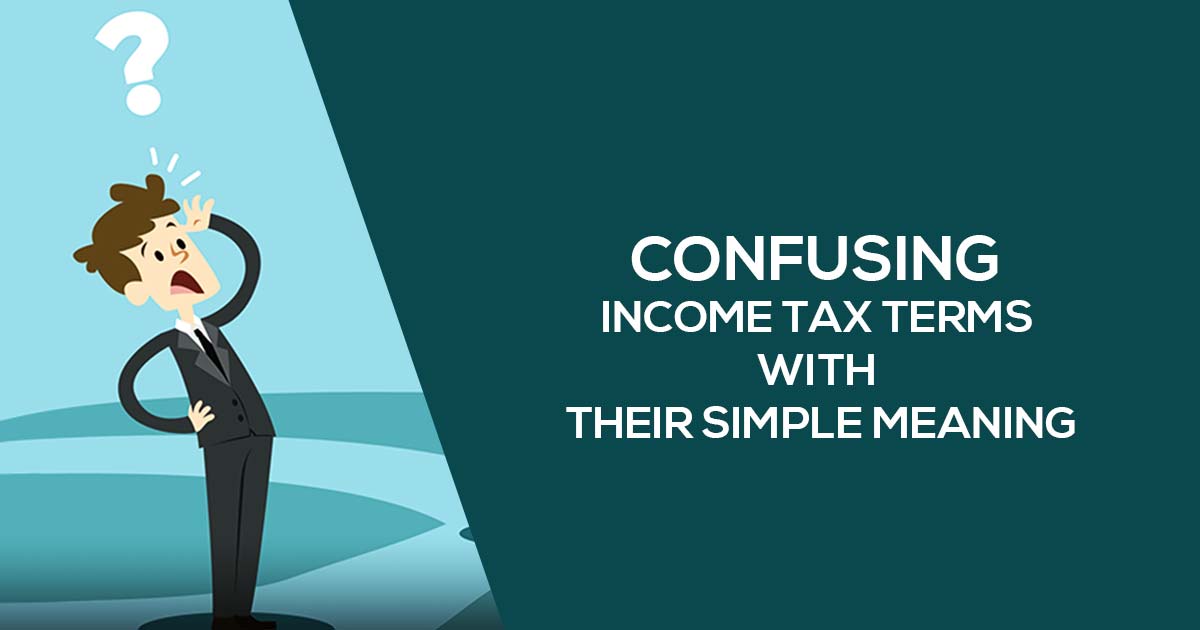
There are so many confusing terms in the tax world, such as financial year and assessment year, gross total income and total income, which we have heard so many times while filing an income tax return (ITR).
When you read or listen to these terms while filing Income Tax Returns, you might get confused and start wondering about the actual difference between them. So it is advisable for you to clear the concepts before filing the tax returns. Here we are going to explain to you five pairs of confusing ITR terms that are mentioned below:-
Financial Year vs Assessment Year
Financial Year: The Financial year is a period of 12 months, which can be generally used for tax purposes and the income you earn during the whole term, as well as paid taxes on the income you earned in the financial year. A financial year commences on 1st April and ends on 31st March.
Assessment Year: Now moving to the assessment year (AY), it always succeeds the financial year, and it is the year in which an individual’s income is assessed. This also starts on 1st April and ends on 31st March. It is the period in which an individual has to assess the previous year’s income on which he/she is liable to file ITR returns.
Read Also: Why Paying Tax is a Human Right and a Civil Duty?
Let’s clear with an example of 2019-20, which is the assessment year of 2018-19.
| Period | Financial Year | Assessment year |
|---|---|---|
| 1st April 2022 to 31st March 2023 | 2022-23 | 2023-24 |
| 1st April 2023 to 31st March 2024 | 2023-24 | 2024-25 |
Gross Total Income Vs Total Income
Gross Total Income (GTI): It is the total income earned by an individual by adding all means of income during the financial year. GTI can be calculated by submission of income from salary, income from house property, profits and gains of business or profession, capital gain and Income from other sources.
Total Income (TI): It is the income that can be calculated after subtracting the various deductions under Chapter VI-A, and it includes Sections from 80C to 80U. To determine Total Income (TI), firstly, you have to calculate the GTI and then minus various deductions and finally, you get TI. Further, understand the formula that is mentioned below:
TI = GTI – deductions under Section 80
Or
GTI = TI + deductions under Section 80
Advance Tax vs Self-assessment Tax
Advance Tax: As the name implies, advance tax means that the entitled taxpayers have paid the income tax in advance, and it is also termed ‘pay as you earn tax’. If you are a salaried employee and your total tax liability is more than Rs 10,000 after accounting for the tax deducted at source by an employer, then you are entitled to pay advance tax.
Salaried employees, freelancers and businesses would be entitled to pay advance tax. The Advance payment tax shall be paid in the financial year in three instalments and as per the dates provided by the income tax department, and the due dates for these payments are 15 September, 15 December and 15 March. The penalty is 1 per cent per month in case of not paying the tax on time.
Self-Assessment Tax: As the name implies, self-assessment tax is the tax being calculated by the taxpayer themselves and while calculating the tax liability and if the taxpayer realises that some part of the tax is due, then he/she must deposit the same to the government on his/her own.
The Self Assessment Tax is to be paid in the assessment year before the filing of Income Tax Returns. The taxpayer is entitled to submit a tax challan, ITNS 280, via specified bank branches or through online mode.
Tax Deducted at Source vs Total tax
TDS: Tax deducted at source (TDS), as the name implies, is the tax that is deducted at the source of income from wherever the person is getting the money, including the employer’s salary, any bank deposits, rent received, etc.
The TDS deduction rates may be different due to the source of income and are not considered as the total tax, as there may be other sources of income also.
Total Tax: Total tax may be summed up as the total tax liability of a person from all sources of income, including the TDS. The total tax includes the entire tax liability, which is a must to pay on the assessment of tax in a particular year or the advance tax liability before filing the returns.
Exemption Vs Deduction
Exemption and Deduction are two different provisions under the Income Tax Act that help to reduce the tax liability on the total income of an individual, and these can be availed under different sections of the Income Tax Act.
Exemption: An exemption is a portion excluded or removed from the gross total income that can be availed only on a specified source of income, not on the total income. Exemption benefits can be availed under Sections 10 or 54 in the Income Tax Act.
It is applicable to leave travel allowance, interest from tax-free bonds, long-term capital gain and more. The amount is to be deducted from the income before the calculation of tax.
Deduction: Deduction refers to the reduction in tax liability by availing benefits under Section 80 (80C to 80U). The total income for the financial year of an individual can be reduced by investing money in life insurance policies, paying for children’s school, tuition fees, etc.








